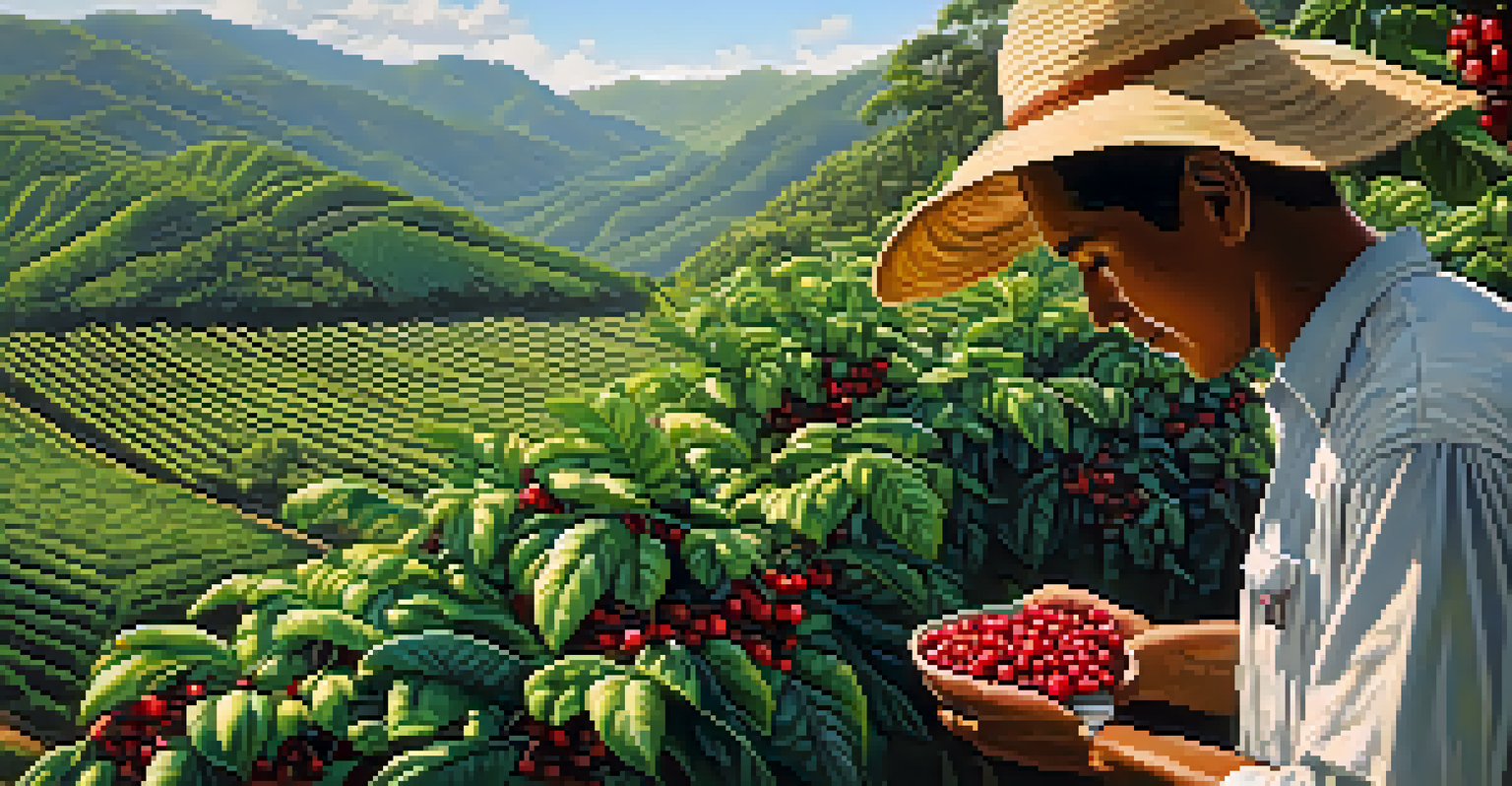The Heart of Brazil: A Journey into Brazilian Coffee Culture

The Origins of Coffee in Brazil: A Historical Overview
Brazil's relationship with coffee dates back to the early 18th century when the crop was first introduced to the country. It quickly flourished, thanks to the country's ideal climate and fertile soil, making Brazil a global coffee powerhouse. By the 19th century, Brazil had become the world's largest coffee producer, establishing its reputation in the international market.
Coffee is a language in itself.
The rise of coffee production transformed Brazil's economy and society, leading to the establishment of vast plantations, particularly in the states of Minas Gerais and São Paulo. This growth also influenced the development of cities, as coffee became the backbone of trade and commerce. The economic impact of coffee can still be felt today, with coffee culture deeply ingrained in Brazilian life.
Today, Brazil is not just about quantity; it’s also about quality. The country produces a variety of coffee beans, including Arabica and Robusta, and has become renowned for its specialty coffee. With this rich history, the essence of Brazilian coffee can be traced through generations, from its humble beginnings to its significant role in the global market.
Brazilian Coffee Varieties: A Taste of Diversity
Brazil is home to a plethora of coffee varieties, each with its unique flavor profile. The most commonly grown are Arabica and Robusta, but within these categories, there are numerous sub-varieties that offer distinctive tastes. For example, the Bourbon variety is celebrated for its sweetness and complexity, while the Catuai variety is known for its balance and smoothness.

Additionally, Brazil's diverse climate and geography contribute to the flavors found in its coffee. Regions like Sul de Minas and Cerrado produce beans with chocolate and nutty notes, while coffee from the Atlantic Rainforest often has fruity and floral characteristics. This diversity allows coffee lovers to explore a wide range of flavors and find their personal favorites.
Coffee's Impact on Brazilian Culture
Coffee is deeply woven into the daily life and social fabric of Brazil, serving as a catalyst for connection and tradition.
Whether you prefer a rich, full-bodied brew or a light, bright cup, Brazilian coffee offers something for everyone. This diversity is not just a marketing gimmick; it reflects the true essence of Brazilian coffee culture, which thrives on experimentation and innovation. It invites coffee enthusiasts to discover the unique tastes that each region has to offer.
The Role of Coffee in Brazilian Daily Life
Coffee is more than just a beverage in Brazil; it's a vital part of daily life and social interactions. Brazilians often start their day with a strong cup of coffee, and many families have their own brewing rituals that have been passed down through generations. This daily routine not only keeps the energy levels high but also strengthens family bonds and cultural ties.
The spirit of the coffee is a spirit of connection, of warmth, and of community.
In Brazilian culture, coffee breaks, known as 'cafezinhos,' are common occurrences, where friends and colleagues gather to enjoy a cup together. These moments provide a break from the hustle and bustle of everyday life, allowing for conversation and connection. It’s a simple yet profound way to foster community and create lasting memories.
Moreover, coffee shops, or 'cafeterias,' are central social hubs in Brazilian cities. They serve as gathering spots for people to relax, work, or catch up with friends over a cup of coffee. This culture of communal coffee drinking enriches Brazilian life, making coffee an integral part of the social fabric.
Traditional Brazilian Coffee Preparation Methods
In Brazil, coffee preparation is an art that varies from household to household. One of the most traditional methods is the use of a 'café coado,' where ground coffee is placed in a filter cone, allowing hot water to drip through slowly. This method produces a rich, flavorful brew that captures the essence of Brazilian coffee.
Another popular method is the use of a 'French press,' which emphasizes the bold flavors and aromas of the coffee. As the coffee grounds steep in hot water, the result is a robust cup that showcases the quality of the beans. Each preparation method highlights different aspects of the coffee, allowing drinkers to appreciate its unique characteristics.
Brazil's Coffee Legacy and Economy
Brazil has transformed into a global coffee powerhouse since the 18th century, shaping its economy and societal culture.
These traditional brewing methods not only reflect the Brazilian approach to coffee but also encourage mindfulness in the process. The act of preparing coffee becomes a cherished ritual, inviting individuals to savor every sip. This dedication to preparation underscores the importance of coffee in Brazilian culture.
Brazilian Coffee Festivals: Celebrating a National Treasure
Brazil takes immense pride in its coffee heritage, which is celebrated through various festivals across the country. Events like the 'Festa do Café' in Minas Gerais bring together coffee lovers, farmers, and enthusiasts to celebrate everything coffee-related. These festivals often feature tastings, workshops, and even live music, creating a festive atmosphere around the beloved beverage.
During these celebrations, visitors can learn about coffee cultivation, processing, and brewing techniques. They also get the chance to taste various coffee varieties, experiencing the wide range of flavors that Brazilian coffee has to offer. It’s a unique opportunity to connect with local farmers and understand the hard work that goes into producing each cup.
These festivals not only highlight the importance of coffee in Brazilian culture but also promote sustainable practices within the industry. By showcasing the stories of farmers and their dedication to quality, these events foster a greater appreciation for Brazilian coffee and its impact on the community.
The Rise of Specialty Coffee Shops in Brazil
In recent years, Brazil has seen a surge in specialty coffee shops, transforming the way coffee is consumed and appreciated. These cafes focus on sourcing high-quality beans, often directly from local farmers, and emphasize unique brewing methods that highlight the coffee's flavor profile. This trend has elevated Brazil's coffee scene, attracting both locals and tourists alike.
Specialty coffee shops provide an immersive experience, where baristas are trained to educate customers about the origins and characteristics of the coffee. They often host cupping sessions, allowing patrons to taste and compare different beans. This hands-on approach not only enhances the coffee experience but also fosters a deeper connection between consumers and producers.
Diverse Coffee Varieties and Flavors
Brazil boasts a rich array of coffee varieties, each offering unique flavors influenced by the country's diverse climate and geography.
As a result, Brazilian coffee culture is evolving, embracing innovation while staying rooted in tradition. The emphasis on quality and sustainability in these specialty shops reflects a growing awareness and appreciation for the craftsmanship involved in coffee production. This shift not only benefits consumers but also supports local farmers and the community.
The Future of Brazilian Coffee: Sustainability and Innovation
Looking ahead, the future of Brazilian coffee lies in sustainability and innovation. As the world shifts towards more environmentally friendly practices, Brazilian coffee producers are increasingly adopting sustainable farming methods. Techniques such as agroforestry and organic farming not only protect the environment but also enhance the quality of the coffee.
Furthermore, technology plays a significant role in the evolution of Brazilian coffee. From precision agriculture to advanced processing methods, farmers are leveraging new tools to improve yields and quality. This innovative approach helps them adapt to changing climate conditions and market demands, ensuring the longevity of coffee production in Brazil.

By prioritizing sustainability and embracing innovation, Brazil is positioning itself as a leader in the global coffee market. The commitment to producing high-quality coffee while caring for the environment sets a positive example for other coffee-producing countries. As Brazilian coffee culture continues to evolve, it remains a vital part of the country's identity and economy.